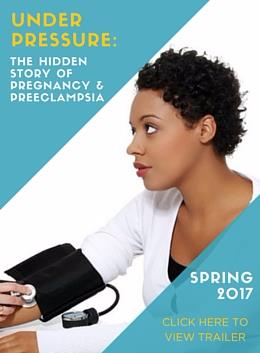September Is National PCOS Awareness Month, And Here’s What Experts Want You To Know About It
September is National PCOS Awareness Month, so we all become better informed about polycystic ovary syndrome. You may not think it affects you, though many women don’t even realize they have it — less than half of the almost 7 million in the United States with the condition know they have it. “PCOS is a metabolic syndrome (not a disease) that results from imbalanced hormones and genetic factors,” Dr. Draion M. Burch, Astroglide TTC Sexual Health Advisor, tells Bustle.
Symptoms of PCOS include: absent or infrequent periods; growing hair in atypical places and/or thinning hair/male-pattern baldness; acne; weight gain; and issues becoming pregnant. In addition, many women with PCOS have polycystic ovaries, which “may be enlarged and contain many small follicles that do not go on to ovulate,” Jeanette Tomasino, MS, RNC, MNN, Director of Clinical Education and Quality at Progyny, tells Bustle. However, PCOS is also about much more than polycystic ovaries.
“The phrase ‘polycystic ovarian syndrome,’ is a misnomer,” Dr. Amy Schutt, a reproductive endocrinologist at the Family Fertility Center at Texas Children’s Pavilion for Women in Houston, tells Bustle. “It focuses on what the ovary looks like — and the reality is that PCOS is about much more than just the ovary. PCOS can affect virtually all aspects of a woman’s health, including reproduction, hormones, and metabolism.”
So, what should a woman with PCOS know about it? Below, experts weighed in on what a woman with PCOS can expect.
1. Who gets PCOS?
“PCOS is an endocrine disorder affecting women of reproductive age; in the U.S., it is estimated that 1:10-1:20 women may be impacted by the disease. The exact cause of PCOS is unknown, however, a genetic basis may be involved, as most women affected have close degree family members — like a sister, mother or aunt — with the same disease.” — Dr. Kecia Gaither, MD, a double board-certified physician in OB/GYN and Maternal Fetal Medicine
2. Why PCOS Needs To Be Diagnosed
“It is necessary for this condition to be diagnosed for several reasons. First of all, the infertility rate is very high. Secondly, having PCOS may make conditions such as type 2 diabetes, high blood pressure, cholesterol and lipid abnormalities, or metabolic syndrome (which indicates an increased risk of cardiovascular disease) more likely. Obesity is also common in women with PCOS.” — Jeanette Tomasino, MS, RNC, MNN, Director of Clinical Education and Quality atProgyny
“While PCOS itself is not serious, it may be associated with other more serious medical conditions. These may include diabetes, high cholesterol, sleep apnea (where a person may stop breathing briefly while sleeping), obesity, or heart disease.” — Heather Dalton, MD, a gynecologic oncology expert with Arizona Oncology, a practice in the US Oncology Network
“It is very important to correctly diagnose PCOS so that underlying metabolic and reproductive issues may be discovered and treated. I call PCOS the ‘canary in the coal mine’ — which is an old saying that means ‘to serve as a warning.’ This is because women often seek medical evaluation due to perceived symptoms of PCOS, and this initial visit allows us to discover and treat other important conditions like insulin resistance, prediabetes, obesity, and uterine abnormalities — issues that may be unrelated to the presenting problem. Women who are not taking birth control pills and who have periods less than every four months need to be evaluated because they are at risk for abnormalities of the uterine lining. Women with PCOS are at risk in the future of developing type 2 diabetes, metabolic syndrome, uterine cancer, and possible heart disease. So it is very important that we identify PCOS when women are young and when we can best intervene.” — Dr. Amy Schutt, a reproductive endocrinologist at the Family Fertility Center at Texas Children’s Pavilion for Women in Houston
3. This Is How PCOS Is Diagnosed
“Your hormones, mainly estrogen and testosterone, are completely lopsided and irregular, causing the annoying symptoms associated with PCOS. The diagnosis of PCOS is primarily made on your medical history and physical exam. Blood work and a pelvic ultrasound will help in making a diagnosis of PCOS.” — Sherry Ross, MD, OB/GYN and Women’s Health Expert at Providence Saint John’s Health Center in Santa Monica, CA
“There is no single test to definitively diagnose the condition. It is based on clinical symptoms, and an in-depth history and physical by your health provider. An expected evaluation will include an assessment of blood pressure, weight, evaluation of hair growth pattern, blood tests to assess hormone levels, pelvic exam, and ultrasound to assess the uterus/ovaries.” — Dr. Kecia Gaither, MD, a double board-certified physician in OB/GYN and Maternal Fetal Medicine
4. What about unwanted hair growth (and hair loss)?
“Excess facial hair growth is caused by extra testosterone in the system. Once the hair is present, it must be removed (laser, electrolysis) or with a cream (vaniqua). There are ways to prevent further hair growth. There are medications that either decrease total testosterone (spironolactone) or increase a protein called sex hormone binding globulin (shbg) that essentially binds the testosterone in the serum, such as birth control pills. These treatments help prevent future hair growth but not hair that is present.” — Dr. Melissa Goist, OB/GYN, The Ohio State University Wexner Medical Center
“PCOS also causes an increase in male pattern and male-type hair. Once a hair has become that thick, male-type hair, the change is permanent. Many women with severe PCOS have to shave their face on a daily basis to prevent facial hair growth.” — Sarah Yamaguchi, MD, OB/GYN at Good Samaritan Hospital in Los Angeles, CA
5. These Are The Medications That Are Given For PCOS
“If you are the 5-to-10 percent of women who suffer horribly from the symptoms of PCOS, there are treatment options available. There is no cure for PCOS, but treatment depends on the symptoms you are experiencing. Treating each symptom separately will depend on how disruptive and annoying each one is in your life and daily routine. Hormones, including the birth control pill or progesterone, are typically used to regulate and balance out your periods. Long-acting reversible contraceptives also known as LARCS’s, include Depo-Provera, Norplant arm implants and intrauterine devices (IUDs), are frequently used to control erratic bleeding.” — Sherry Ross, MD, OB/GYN and Women’s Health Expert at Providence Saint John’s Health Center in Santa Monica, CA
“Treatment of PCOS depends on the patient’s goals. For patients seeking weight loss and cosmetic improvement who do not desire pregnancy, the use of birth control pills for cycle regularity, anti-androgens, such as spironolactone to reduce undesired hair growth, and insulin sensitizers, like metformin to possibly accelerate weight loss and restore better glucose control, are first-line therapies. The Pill has the added benefit of both suppressing male hormone production from the ovary and blocking androgen receptors, which helps slow or eliminate new hair growth. For patients with established dark hair growth on lip, chin, or elsewhere, electrolysis or laser hair removal are recommended. Prolonged use of the Pill also helps reduce the risk of ovarian and endometrial (uterine) cancer and has no net effect on breast cancer rates.” — Dr. Daniel Shapiro, Reproductive Endocrinologist and Fertility Specialist at Reproductive Biology Associates
7. What changes can you make if you don’t opt for medications?
“I am a registered dietitian nutritionist who specializes in PCOS. It took me four doctors to get a diagnosis. I didn’t have the classic symptoms of PCOS — my periods were always regular, I never had hair loss or excessive hair growth. What I did have was low blood sugar, and I started gaining weight out of the blue. This is while eating a healthy diet and doing a lot of exercise. In three months, I gained 35 pounds, with the majority being in my mid-section. That’s how I knew something wasn’t right. After I finally saw the right doctor and got diagnosed, I made it my mission to educate other health professionals about PCOS. I authored PCOS: The Dietitian’s Guide, and speak regularly to dietitians and women with PCOS.” — Angela Grassi, MS, RD, LDN, PCOS Nutrition Center
8. Pregnancy Is Possible With PCOS
“PCOS is the most common cause of infertility in women. These symptoms are related to the underlying hormonal imbalances that occur in PCOS. So what causes these symptoms? Normally, a carefully orchestrated conversation between the brain and the ovary occurs each month to control the growth and release of an egg (this is called ovulation). This is how women without PCOS may have regular, monthly periods. However, in PCOS, this hormonal conversation between the brain and the ovary is out of sync. This is what causes skipped periods, infertility, and the other symptoms associated with PCOS.” — Dr. Amy Schutt, a reproductive endocrinologist at the Family Fertility Center at Texas Children’s Pavilion for Women in Houston
“Physicians can advise on several drugs to promote ovulation induction, such as Clomid, or injections of gonadotropins (hormones which affect the production of the sex hormones). In Vitro Fertilization may also provide an option for women so affected with PCOS.” — Dr. Kecia Gaither, MD, a double board-certified physician in OB/GYN and Maternal Fetal Medicine
9. What kind of support groups are available for people with PCOS?
“After I was diagnosed and experienced the frustration of trying to find credible information and a supportive environment of women who understood what I was going through, I started SoulCysters.net. To date, there are over 100,000 members on the free site. The experience of having PCOS, and founding SoulCysters, inspired me to go into consumer health journalism — three years after my diagnosis, I became the medical anchor for CNN-HLN. While I was initially on medication for my PCOS, I have been able to completely manage my symptoms (hair/skin issues, irregular cycles, 90-pound weight loss) with lifestyle changes. I currently work with a nutritionist and workout regularly. My eating, rest, and physical activity are critical to staying symptom-free.” — Kat Carney, Founder of SoulCysters.net
10. This Is What To Remember About PCOS
“The take-home message is that PCOS is very common, with a prevalence of about 10 percent in reproductive-aged women. Fortunately, we can successfully treat the symptoms of PCOS. Women with PCOS can have children in the future, though they may need help from a fertility specialist.” — Dr. Amy Schutt, a reproductive endocrinologist at the Family Fertility Center at Texas Children’s Pavilion for Women in Houston






